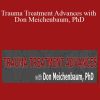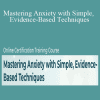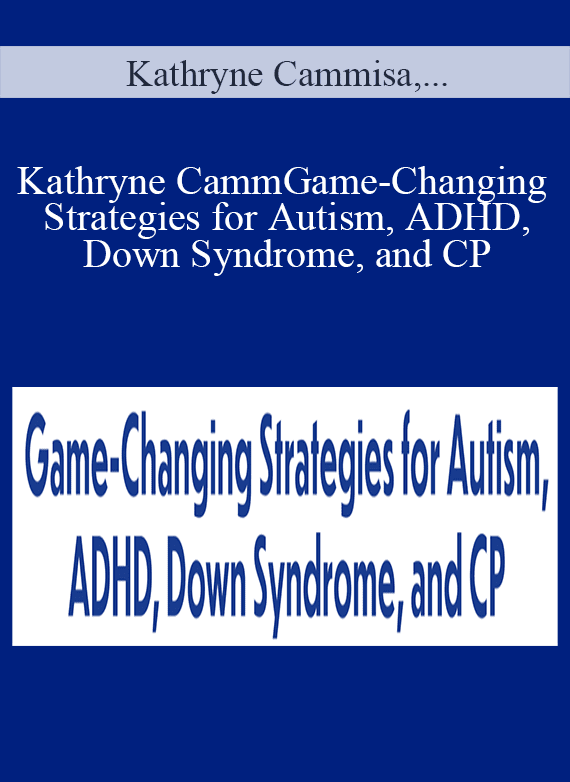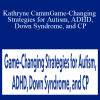Kathryne Cammisa, Albert “Skip” Rizzo, Mona Delahooke, Laura K. Sibbald & Lisa Weed Phifer – Game-Changing Strategies for Autism, ADHD, Down Syndrome, and CP
$149.00 Original price was: $149.00.$44.00Current price is: $44.00.
Digital Download: You will receive a download link via your order email
Should you have any questions, please contact us: [email protected]
 Kathryne Cammisa, Albert “Skip” Rizzo, Mona Delahooke, Laura K. Sibbald & Lisa Weed Phifer – Game-Changing Strategies for Autism, ADHD, Down Syndrome, and CP
Kathryne Cammisa, Albert “Skip” Rizzo, Mona Delahooke, Laura K. Sibbald & Lisa Weed Phifer – Game-Changing Strategies for Autism, ADHD, Down Syndrome, and CP
I’ve seen and tested most holistic approaches to treating children with special needs in the home, school, childcare, and clinical settings in my three decades of practice.
I can tell you there is nothing more rewarding than watching your most dysregulated kids master critical self-regulation skills and feel empowered to make good choices.
In working with hundreds of educators, families and children with Autism, Sensory Disorders, ADHD, development disorders, Down syndrome, and cerebral palsy…
I can confidently tell you that it is possible to have more rewarding days with fewer explosive meltdowns and uphill battles managing difficult behaviors.
Join me on a journey from empirical evidence to practical solutions for social, emotional, and sensorimotor regulation.
You’ll get game-changing strategies to calm the nervous system, increase positive behavior and promote emotional independence to masterfully customize mind and body practices for any individual client and their families… at every stage of development.
That’s not all: register now to get an exclusive bonus offer that includes dozens of hands-on solutions from a multidisciplinary panel of educators and clinicians… absolutely free.
Why? Because I believe that the next generation of educators and clinicians need strategies that will help accelerate your career, as innovative interventions like these have done for mine.
See you in the course,
Kathryne Cammisa, MHE, OTR/L
Broken down into TWO powerful experiential self-study modules… you’ll get the hands-on training and tools you need to empower positive behavior from the inside out and the outside in.
You’ll get more than the neurobiological basics of “why” and “how” sensory impacts behavior which makes paying attention difficult for your youth clients. You’ll walk away with the foundational knowledge to deliver expert care and create customizable treatment sessions that will leave you and your client feeling empowered.
Attachment & Self-Regulation: Tools for Empowering Positive Behavior from the Inside Out
The Neurobiology of Regulation
- Attachment & How Relationships Impact the Brain
- Mirror Neurons
- Therapeutic implications & techniques
- Oxytocin
- Therapeutic implications & techniques
- Attachment styles & their impact on behavior
- Attachment & attunement to support & empower therapeutic relationships
- Therapeutic use of self with difficult kids
Effects of Anxiety & Stress on Self-Regulation
- Stress response patterns as survival strategies
- Consequences of stress on mental & physical functioning
- Anxiety & brain research
- Moving from fight, flight, freeze to rest & digest for better learning
- Quick stress busters for kids
Strategies to Support & Sustain Self-Regulation
- Developmental sequence of self regulation
- Strategies for each stage
- Scaffolding: moving kids from where they are to the next level
Calming the Nervous System
- Techniques for infants to young adults
- Quick relaxation breaks
- Formal relaxation strategies
- Stress reduction lab: practices for lower to higher functioning individuals
Empower & Motivate Kids for Emotional Independence
- Game-Changing Interventions for Positive Behavior from the Inside Out
- Mindfulness
- Social stories
- Video modeling
- Visualization
- Affirmations
- Building confidence
- Developing autonomy & intrinsic motivation
Techniques to Deal with Difficult Behaviors
- Minimize or Eliminate:
- Tantrums
- Elimination problems
- Troubling sleep patterns
- Eating issues
- Transitions
- Sensory issues
Utilizing Behavior Modification Techniques for Effective Interventions
- Positive discipline
- Alternatives to punishment
- Gradual exposure to broaden tolerance
- Self management to empower kids
Self-Regulation Problem Solving Lab
- Case studies to link what we have learned to your caseload
Yoga for Sensory, Motor & Regulation Skills in Kids with Autism, ADHD, Down Syndrome & Cerebral Palsy: Tools for Empowering Kids from the Outside In
Yoga Poses and Techniques For: Autism Spectrum Disorder
- Breathing exercises for awareness & regulation
- Poses to calm & relax the nervous system
- Partner poses for facilitating dyadic cooperation
- Meditation for strengthening attention
- LAB: Practice techniques
Exercises for Attention Deficit Disorder (ADHD)
- Breathing exercises for calming the nervous system
- Centering exercises for reigning in attention & bringing energy levels down
- Facilitating focus via balance & core strengthening poses
- Relaxation for calming the body & mind
- Meditation to improve attention span
- LAB: Practice techniques
Behavior and Emotional Problems
- Addressing resistance
- Precautions for dealing with childhood trauma, abuse and neglect
Developmental Coordination Disorder
- Breathing exercises for assisting with focus
- Promote motor planning via sequenced poses
- Relaxation for relieving anxiety
- LAB: Practice techniques
Special Needs: Cerebral Palsy & Increased Tone
- Breathing exercises for awareness & strengthening the diaphragm
- Elongate flexors/adductors for improved range of motion & movement
- Stretch hamstrings for improved posture
- Relaxation for increasing body awareness
- Meditation for assisting with focus & visual motor skill
- LAB: Practice techniques
Downs Syndrome & Low Tone
- Breathing to invigorate the nervous system
- Body awareness activities
- Poses for strengthening core muscles
- Meditation for focus & awareness
- LAB: Practice techniques
Yoga Games
- Body awareness
- Creativity
- Gratitude
- Trust and cooperation
- Quiet games
- Listening and focus
- Partner poses
- LAB: Practice techniques
Adapt Yoga for Different Age Groups & Settings
- Infants, Toddlers & Preschoolers, School age
- Clinic, classroom, home
Meet Your Experts
Kathryne Cammisa, MHE, OTR/L, is an SI/NDT certified occupational therapist, American Council on Exercise certified personal trainer, Pranakriya certified yoga therapist, Radiant Child/Family 200-hour certified yoga teacher, and Mindful Schools certified mindfulness teacher. Kathee has over 25 years of experience working with children with special needs in the home, school, child care, and clinic settings. She works with children and their families through her private practice and at Children’s Place, a therapeutic child care center. Kathee has extensive teaching experience throughout the country, with Georgia State’s Project SCEIS, and the Medical College of Georgia where she served as assistant professor of occupational therapy. She has been published in the American Journal of Occupational Therapy and Occupational Therapy in Mental and has taken yoga and occupational therapy to children in China, Vietnam, Costa Rica, and Ghana.
Albert “Skip” Rizzo, PhD, is a clinical psychologist and Director of Medical Virtual Reality at the University of Southern California Institute for Creative Technologies. He is also a Research Professor with the USC Dept. of Psychiatry and at the USC Davis School of Gerontology. Over the last 25 years, Skip has conducted research on the design, development and evaluation of Virtual Reality systems targeting the areas of clinical assessment, treatment and rehabilitation across the domains of psychological, cognitive and motor functioning in both healthy and clinical populations. This work has focused on PTSD, TBI, Autism, ADHD, Alzheimer’s disease, stroke and other clinical conditions. Some of his recent work has involved the creation of artificially intelligent virtual human (VH) patients that novice clinicians can use to practice skills required for challenging diagnostic interviews and for creating online virtual human healthcare guides, and clinical interviewers with automated sensing of facial, gestural, and vocal behaviors useful for inferring the state of the user interacting with these virtual human entities. Despite the diversity of these clinical R&D areas, the common thread that drives all of his work with digital technologies involves the study of how interactive and immersive Virtual Reality simulations can be usefully applied to address human healthcare needs beyond what is possible with traditional 20th Century tools and methods.
Mona Delahooke, PhD, is a licensed clinical psychologist with more than 30 years of experience caring for children and their families. She is a senior faculty member of the Profectum Foundation, an organization dedicated to supporting families of neurodiverse children, adolescents, and adults. Dr. Delahooke holds the highest level of endorsement in the field of infant and toddler mental health in California, as a Reflective Practice Mentor (RPM). She is a frequent speaker, trainer, and consultant to parents, organizations, schools, and public agencies. Dr. Delahooke has dedicated her career to promoting compassionate, relationship-based neurodevelopmental interventions for children with developmental, behavioral, emotional, and learning differences. She is the author of the award-winning book, Beyond Behaviors: Using Brain Science and Compassion to Understand and Solve Children’s Behavioral Challenges (PESI, 2019), and the upcoming book, Brain-Body Parenting, now available for preorder. Her popular blog, at www.monadelahooke.com, covers a range of topics useful for caregivers and childhood providers.
Laura K. Sibbald, MA, CCC-SLP, ASDCS, CYMHS, is a nationally-certified speech-language pathologist who has extensive experience supporting the social-emotional and pragmatic language needs of students and families within the Washington, DC, metropolitan region. She works as an instructional specialist for students with autism in Prince George’s County Public Schools, Maryland and has developed and implemented a variety of professional learning opportunities surrounding social-emotional competence at the state and national levels. Laura is a coauthor of the Trauma-Informed Social-Emotional Toolbox for Children & Adolescents: 116 Worksheets & Skill-Building Exercises to Support Safety, Connection & Empowerment (PESI, 2020) and the Parenting Toolbox: 125 Activities Therapies Use to Reduce Meltdowns, Increase Positive Behaviors & Manage Emotions (PESI, 2018). She is a member of the multicultural affairs committee of the Maryland Speech-Language and Hearing Association, Laura earned additional certifications as a Relationship Development Intervention (RDI) Certified Educator and in Educational Leadership and supervision. She graduated from The George Washington University in 2011 with a Master’s in speech-language pathology.
Lisa Weed Phifer, DEd, NCSP, is a nationally-certified school psychologist, certified Autism Spectrum Disorder Clinical Specialist, and author who has a well-established career supporting school-based mental health and social-emotional learning for children and adolescents. Phifer’s work has focused on integrating cognitive-based therapy (CBT) and core social-emotional competencies into practical, child-focused activities. She has presented across the U.S. and internationally to educators, clinicians, and parents, on topics of CBT, trauma-informed practices, and social-emotional learning. She is the lead author of the CBT Toolbox for Children & Adolescents (PESI, 2017), Parenting Toolbox (PESI, 2018), and the Trauma-Informed Social-Emotional Toolbox for Children & Adolescents (PESI, 2020). Additionally, she is published in the School Mental Health Journal and contributed to both editions of Supporting and Educating Traumatized Children (Rossen, 2020).
Sale Page: https://catalog.pesi.com/sales/bh_c_001355_socialemotionalsensori_organic-110533
Archive: https://archive.fo/q7zXA





Reviews
There are no reviews yet.